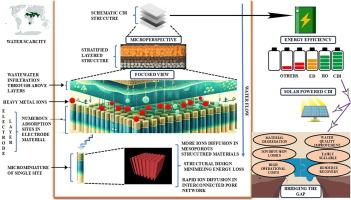Next-Generation heavy metal water Treatment: A Primer on modified Capacitive deionization
IF 13.3
1区 工程技术
Q1 ENGINEERING, CHEMICAL
引用次数: 0
Abstract
Addressing the critical challenge of freshwater scarcity demands innovative and effective methods for removing heavy metals from water sources. Despite several conventional techniques, there is a significant gap in developing energy-efficient and high-performance solutions. Capacitive Deionization (CDI) emerges as a frontrunner in this domain, offering unparalleled benefits in water recovery, energy efficiency, and ion selectivity, surpassing many traditional methods. This review synthesizes recent advancements in CDI, particularly in module design, electrode materials, configurational enhancements, energy comparisons and system applications, highlighting its transformative impact. We differentiate our analysis by providing a detailed comparison with existing CDI modular technologies, demonstrating CDI’s superior potential in scalability and efficiency for different heavy metal remediation. Furthermore, we identify persistent challenges, such as optimizing CDI reactors for industrial-scale applications, and address the critical knowledge gaps that hinder broader adoption. Our strategic recommendations are designed to bridge the gap between experimental research and practical implementation, positioning CDI as a pivotal technology in addressing global water treatment needs.

求助全文
约1分钟内获得全文
求助全文
来源期刊

Chemical Engineering Journal
工程技术-工程:化工
CiteScore
21.70
自引率
9.30%
发文量
6781
审稿时长
2.4 months
期刊介绍:
The Chemical Engineering Journal is an international research journal that invites contributions of original and novel fundamental research. It aims to provide an international platform for presenting original fundamental research, interpretative reviews, and discussions on new developments in chemical engineering. The journal welcomes papers that describe novel theory and its practical application, as well as those that demonstrate the transfer of techniques from other disciplines. It also welcomes reports on carefully conducted experimental work that is soundly interpreted. The main focus of the journal is on original and rigorous research results that have broad significance. The Catalysis section within the Chemical Engineering Journal focuses specifically on Experimental and Theoretical studies in the fields of heterogeneous catalysis, molecular catalysis, and biocatalysis. These studies have industrial impact on various sectors such as chemicals, energy, materials, foods, healthcare, and environmental protection.
 求助内容:
求助内容: 应助结果提醒方式:
应助结果提醒方式:


